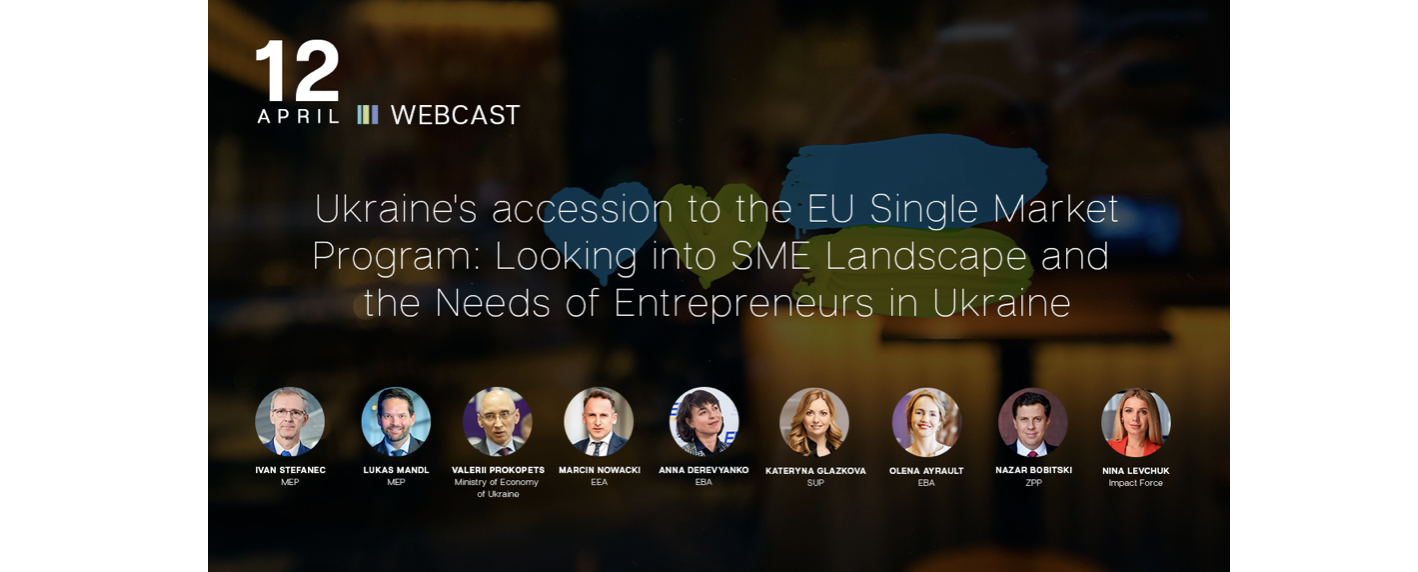Ukraine’s Accession to the EU Single Market Program: Looking into SME Landscape and the Needs of Entrepreneurs in Ukraine

On Wednesday, 12 April 2023, SME Connect hosted a virtual discussion organised in cooperation with the Union of Entrepreneurs and Employers (ZPP) and the European Enterprise Alliance under the patronage of IVAN STEFANEC MEP and LUKAS MANDL MEP. Our guests and interlocutors were MARCIN NOWACKI, President of the European Enterprise Alliance (EEA) ; EESC Rapporteur to the opinion on the EU-Ukraine solidarity lanes; VALERII PROKOPETS, Deputy Director – Head of Division, Department of Regulatory Policy and Entrepreneurship, The Ministry of Economy of Ukraine; ANNA DEREVYANKO, Executive Director of the European Business Association (EBA); KATERYNA GLAZKOVA, Executive Director Center of the Union of Ukrainian Entrepreneurs (SUP); OLENA AYRAULT, Unlimit Ukraine programme coordinator with the European Business Association (EBA); NAZAR BOBITSKI, Union of Entrepreneurs and Employers Kyiv Office; NINA LEVCHUK, Co-founder of Impact Force and United for Ukraine; moderated by DR. HORST HEITZ, Chair of the Steering Committee of SME Connect.
In his welcome speech IVAN STEFANEC MEP reminded that European unity over Ukraine needs to be translated into concrete steps. He underlined the need to work jointly in order to mitigate the challenges common to all EU countries so as for Ukraine like access to finance, excessive bureaucracy and education of skilled labor force. He also mentioned the current important initiatives available for Ukraine with accession to the EU Single Market Programme such as “Ready for EU” fund, “Erasmus for Young Entrepreneurs” programme and the EU-UA matchmaking platform for business.
LUKAS MANDL MEP, in his turn, expressed support for the European Commission’s endeavours for concrete reconstruction plan for Ukraine effective immidiately. He stressed the value of likeminded partners in current times and how their unity is to strengthen the European Single Market and Europe as a whole. Mr. Mandl emphasized that Europe must not remain the continent of consumption but continent of production and that’s where Ukraine has potential.
In his introduction, MARCIN NOWACKI has spoken on the current state of affairs with Ukraine’s integration into the EU Single Market. Referring to the practical knowledge, Mr. Nowacki walked the audience through the various business sectors indicating the critical areas that still require conformity with the EU standards. He emphasized how important it is for local EU partners to provide quality reference to Ukraine’s SMEs they are partnering with for specific agencies assisting with certification. Mr. Nowacki appealed to start the EU accession negotiations with Ukraine this year to secure a steady pace of integration advancement that would benefit SMEs on both sides.
VALERII PROKOPETS Deputy Director – Head of Division, Department of Regulatory Policy and Entrepreneurship with the Ministry of Economy of Ukraine, welcomed the initiatives and programmes now available to Ukraine, like “Business Bridge” with budget of 4.5 million EUR designed to support UA SMEs with access to services and trade fairs in the EU. He remarked that “Business Bridge” would not just benefit UA businesses but also EU businesses affected by the loss of Russian or Belarussian markets by connecting with new suppliers and customers from Ukraine.
ANNA DEREVYANKO of the European Business Association (EBA) briefed the audience on some trends based on the business sentiment survey conducted by the EBA. Despite the overall positive dynamics, business in Ukraine remains difficult to sustain and develop. Ms. Derevyanko emphasized the need to increase the amount of grants and loans that are part of the EU support, to develop mechanisms of political risks insurance for potential investors as well as export promotion mechanisms in order to boost mutual exports.
KATERYNA GLAZKOVA of the Union of Ukrainian Entrepreneurs (SUP) suggested that quality access to information for Ukrainian entrepreneurs would double the success of financial assistance provided by the EU programmes and grants. Consulting assistance, step by step instructions on how to start at the EU Single Market as well as promotion platforms for Ukrainian goods are required. Interesting fact – 60% of all UA export last year went to Poland, Romania, Hungary, Germany and the Netherlands.
OLENA AYRAULT, Unlimit Ukraine programme coordinator with EBA, reiterated the call for increased attention when it comes to educational programmes assisting entrepreneurs that try to enter EU market. She remarked that “Erasmus for Young Entrepreneurs” has proven to be a really effective programme responding perfectly to these needs.
NAZAR BOBITSKI of the Union of Entrepreneurs and Employers Kyiv Office remarked that addressing the deficiencies in understanding and implementing of the EU rule book on technical standards would be the single biggest contribution to help Ukrainian SMEs succeed on the EU market. Furthermore that would foster important institutional reforms in product safety, consumer protection and market survelliance as well as promote in Ukraine an EU-aligned regulatory climate particularly in those sectors that can benefit from EU investment.
NINA LEVCHUK, co-founder of Impact Force, emphasized the importance of keeping focus on social and sustainable economy goals despite the hardships of the war. Educating and encouraging Ukrainian SMEs to uptake sustainable processes during reconstruction will foster investment and facilitate Ukraine’s green transition.